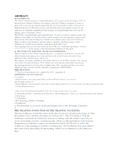| dc.contributor.author | Ndetei, David M | |
| dc.contributor.author | Ongecha-owuor, Francisca | |
| dc.date.accessioned | 2014-01-30T06:53:32Z | |
| dc.date.available | 2014-01-30T06:53:32Z | |
| dc.date.issued | 2006-02 | |
| dc.identifier.citation | Ndetei David M., Ongecha-owuor Francisca. The Psychotrauma Trainingworkshop For The Laguage Services Sectlon (lss) Staff Of The United Nations International Criminal Tribunal For Rwanda (UNICTR) Ngurdoto Mountain Lodge, 27-29 January, 2006 And Impala Hotel, 3-5, February, 2006 In Tanzania | en_US |
| dc.identifier.uri | http://hdl.handle.net/11295/64409 | |
| dc.description.abstract | BACKGROUND
The United Nations Security Council Resolution 955 created on 8th November 1994 311
International Criminal Tribunal (hereinafter called the Tribunal) intended to 'bring to
justice those persons presumed responsible for acts of genocide or other violations of
humanitarian law on Rwanda territory, and Rwanda citizen presumed responsible for
such acts or violations committed on the territory of neighbouring States between 01
January and 31 December 1994"
The ICTR is an independent and impartial body. It consists of three separate organs: the
Judiciary, the Office of The Prosecutor (which conducts the investigations and presents
the cases in court) and the Registry (which is the administrative arm of the Tribunal).
There are three trial chambers and one appeals chamber. All fifteen judges of the
Tribunal are of different nationality, none being from RW311da.
The Language Services Section (LSS) for the ICTR was established pursuant to Articles
**************of the Statute of the International Tribunal for Rwanda.
b. THE REQUEST FOR THIS TRATh'ING WORKSHOP
This was made by the LSS through the Registry, to equip the staff in this section with
skills to help them manage any work and non-work related trauma to enable them
undertake their mandate more effectively.
The request was made to Professor David M. Ndetei by the ICTR in Arusha. The training
was to last two and a half days. Prof. Ndetei was to design the curriculum and prepare
the training materials to fit into this available time. This was done and the programme
which was later revised to fit the schedule is attached in APPENDIX I
THE TRAINEES
***The list of participants was supplied by LSS - Appendix II
METHODS AND MATERIALS
1. Lectures
• Prepared notes were presented either on PowerPoint format or screened in
full through a projector .
• Diagrammatic representations were done on flip charts either for the main lecture or from group discussions
2. Detailed lecture notes:
• These were distributed immediately after the lecture on the respective topic.
3. Group discussions - summarized in flip charts and transparencies which were then presented at the plenary
4. Role plays
5. Evaluations
• Pre-Training and Post-Training
• Facilitators
6. Psychotrauma Assessment on the participants (Part of Pre-Training evaluation)
7.
PRE-TRAINING INSPECTION OF THE TRAINING FACILITIES
The two facilitators visited the courts on the day of arrival to get prior knowledge of what
the trainees work schedule and nature of work involves. This was mainly to help the
facilitators communicate effectively in terms of feelings with the trainees especially on
issues of secondary trauma! vicarious trauma, which was the main theme of the training.
Preparation of conference venues was undertaken both by ICTR staff as well as the
Faci
litators in the morning of each first workshop day. The Facilitators then proceeded to
the courts before proceeding for the training, which was to commence in the afternoon
then. | en_US |
| dc.language.iso | en | en_US |
| dc.publisher | Universitylof Nairobi | en_US |
| dc.title | The Psychotrauma Trainingworkshop For The Laguage Services Sectlon (lss) Staff Of The United Nations International Criminal Tribunal For Rwanda (UNICTR) | en_US |
| dc.type | Presentation | en_US |


